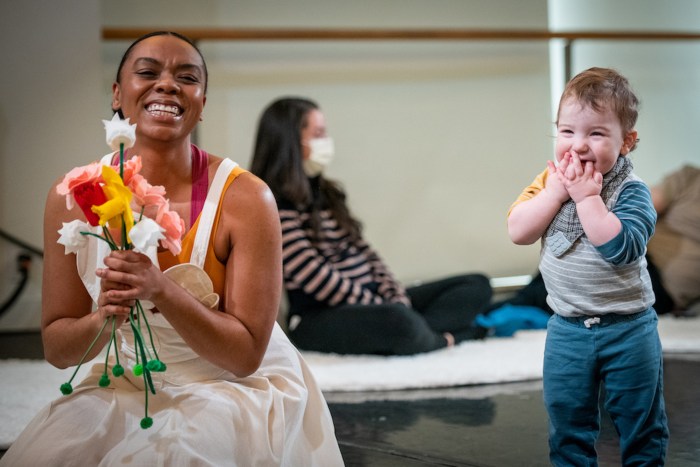BY SCOTT STIFFLER
False notes aside, latest from Vampire Cowboys gets real and stays true
When a non-Asian’s vision of Vietnam is all rice patties and duplicitous schemers and sad stories told by sexy but chaste whorehouse workers, it’s clearly racist. But when an Asian American packs Part III of his “Gook Story” trilogy with all the above — plus murder, betrayal, cannibalism and fellow countrymen whose ninja moves are sharper than their English skills — it is, of course, hysterically funny. Add in gunfights, motorcycle chases and lovers on a quest and you’ve got all the giddy fixins we’ve come to expect from Vampire Cowboys.
Over the past nine years, the Downtown theater troupe has built a well-deserved following by pioneering and popularizing “Geek Theater” — which takes what we know about pop culture icons, images and narrative traditions and mercilessly deconstructs them without abandoning its sincere admiration for the endearing excesses and shitty shortcomings of comic books, sci-fi and superheroes.
But what happens when the badass baby daddy of these fun-centric plays full of zombies, blood and dismemberment longs for more? Declaring that mastering the genre he spawned is no longer enough, a manifesto in the show’s program vows, “…it’s time for VC to either evolve or die…expanding the vision of Vampire Cowboys to include a wider spectrum of artists and influences…this next chapter in our epic artistic journey is gonna be awesome.”
Playwright Qui Nguyen embeds himself, his legacy and choppy stabs at self-analysis deep into the tasty marrow of “The Inexplicable Redemption of Agent G.” The man with the plan doesn’t make many promises he can’t keep. “Agent G” is truly awesome and totally worth your time. But as VC geeks know, it’s fun to pick apart the things you love. Besides, we’ve got the rest of the page to fill and some legitimate gripes to air — and while the very real flaws of this work aren’t in any way dealbreakers, they (along with the incredibly skilled performances) have a way of staying with you long after the comparatively disposable laughs have begun to fade like distant vapor trails. Maybe that’s because the inaugural articulation of Nguyen’s bold new vision sets the bar so damn high by tugging at heartstrings when it should be severing arteries. More about that later. For now, let’s dwell on what’s good about “Agent G” — which, keep in mind, is most of what’s there.
As pulpy plot descriptions go, nobody does it better than the show’s press release: “He lost his country, his family, and his soul. But what he hasn’t lost is his taste for revenge! It’s been 10 years since Agent G has last been to Vietnam where his family and friends were all viciously slain. He’s now come back looking for answers and a good bit of revenge — but mysterious forces, as well as the playwright, are actively trying to stop him from finishing his brutal task.”
That brutal task is carried out amidst a brilliant conceit — in the form of Nick Francone’s set (whose giant white letters spell out V-I-E-T-N-A-M). A variety of motifs are projected onto the letters (a lush green jungle, falling snow, sexy babes) — just as a variety of personas and agendas are grafted onto the ever-shifting main characters. Hung (Paco Tolson) is our hero; a damaged Vietnamese soul who returns to his country when a mysterious brothel worker (Amy Kim Waschke) writes a letter in which she dangles answers to Hung’s nagging questions about the fate of his parents. Along for the trip, and a few fight scenes, is Hung’s fiancé Molly (Bonnie Sherman). They’re helped, and screwed over, by a variety of shifty characters played by Jon Hoche (the funniest of them being Tien — who tells Hung he’s a “secret South Vietnamese freedom fighter who knowing both your mother and father”).
All these characters are made to repeat their classic quest scenario in a variety of different fashions, courtesy of on-set rewrites by the playwright himself — who appears frequently to break the fourth wall and buck up his skeptical cast by justifying the many narrative shortcomings and highly subjective takes on the truth. Nguyen, by the way, is played by an African American man (William Jackson Harper) — because although the playwright’s skin is yellow, he believes in his heart that his soul is black boy cool. So much of “Agent G” boils down to sad reality vs. hot, sexy, wish fulfillment.
In the process of reconciling these two competing visions of self, the truth doesn’t just get lost: It takes a U-turn, follows a yellow brick road, falls down a rabbit hole and rips itself a new one. Discerning what really happened to Nguyen’s real-life cousin during his ill-fated 1988 escape by boat from Vietnam becomes a lost cause and a moot point. But the fact that we’re told upfront how this is all true stays in our heads like a cruel poppy seed in granny’s dentures.
My favorite line of the night? It’s when Hung assures us “And what you are about to see is all completely true. And as we all know, true stories wet your vaginas and get your dicks hard. True stories are awesome!”
So was there really murder and cannibalism on that boat trip? What happened to Hung’s little brother, if he even existed? Did vegetarian Buddhist Hung really knife a man and eat him, as he lay bleeding and not yet dead? And why did Nguyen’s two previous plays (“Trial by Water” and “Blood in America”) fail to do justice to the legacy of his cousin’s struggle? Moreover, why should we care about an author who gives generous stage time to analyzing his own creative failings while failing to sincerely, fully fault himself for indulging in self-doubt while people like his cousin are haunted by more pressing problems? How can a playwright who spends much of his third act arc dissing David Henry Hwang for being a self-congratulatory prick fall into the same sad trap as his Uptown archenemies?
Wow! What a full plate of angsty concerns. It’s worth keeping in mind, then, how very much of the play is giddy, violent, self-aware fun. Maybe it’s best to turn a blind eye to these shortcomings and enjoy the Katie Perry parody production number, the plentiful fight scenes, the absolutely kickass cast and the giant “Gookie Monster” puppet who has an MC duel with the playwright about what it takes to be Asian. That’s just a partial list of what’s great about “Agent G” — but Nguyen told us going in that this alone wasn’t enough anymore for Vampire Cowboys. We were promised the next chapter in their epic artistic journey. We were promised redemption. But just seeing them do what they’ve done, bigger and better than ever before, is all the evolution you could ask for.





































